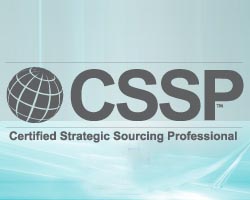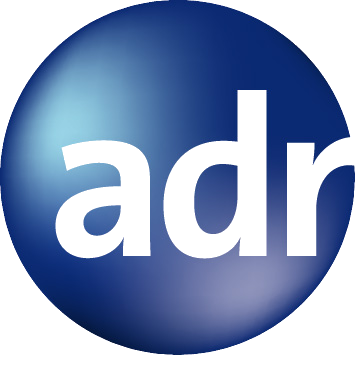
The Certified Strategic Sourcing ProfessionalTM (CSSP) program certifies that you have mastered strategic sourcing and that you are therefore capable of delivering enormous value to your organization. Value which is delivered as a result of strategic sourcing derives from cost, quality, risk, sustainability, supply continuity, and capital preservation among others.
The CSSP designation recognizes that you are competent in the best industry practices in strategic sourcing.
Why should you earn the CSSP designation?
The strategic sourcing discipline is applicable to all major procurement activities. Besides procurement professionals, CSSP also recognizes strategic sourcing competencies of marketing, legal, IT, and HR practitioners engaged in purchasing and contracting.
The need for strategic sourcing capabilities is needed today more than ever as companies worldwide struggle with many new changes and influences – from natural disasters to shifting economic power from the west to the east. The time is right to recognize the value of qualified professionals by acquiring the CSSP designation.

Recertification is required every 3 years and can be earned by:
- Retaking the CSSP Online Examination.
- Presenting a strategic sourcing project in which the candidate was a major contributor.
- Attending fourty-five (45) Continuing Education Hours (CEHs) from learning, training, teaching or coaching
strategic sourcing or related subjects through recognized organizations.
Successful examinees and project applicants who wish to get a physical copy of the CSSP Certificate may apply for one through the Issuance of Physical Certificate Form attached in the certification letter
The Issuance Date reflected on your certificate is the date you have been advised of your designation. Should you apply for a certificate months after being advised of your designation, this will not add to the validity period of your designation.
Those who do not obtain a physical copy of the CSSP Certificate are still considered certified and entitled to use the CSSP designation.

Online Learning
PASIA offers online learning via the Online Supply Chain Academy (OSCA). Professionals looking for an interactive learning
experience that can be accessed any time and place may avail a combination of any of the following modules:
- Portfolio Analysis
- Business Needs Analysis
- Competitive Bidding
- Financial Analysis 1
- Deconstructing Price 1: Ask, Price Harmonization, Volume Aggregation and Historic Analysis
- Deconstructing Price 2: Comparative and Price List Analysis
- Deconstructing Price 3: Creating Competition
- Deconstructing Price 4: Should Cost Analysis
- Deconstructing Price 5: Could Cost Analysis
- Opportunity Analysis
- Price Reduction and Price Analysis
- Risk Management
- Stakeholder Engagement
- Supplier Relationship Management and Optimization
- Supply Market Analysis
Certified Strategic Sourcing Professional Program Modules
Module 1 – Essentials of Strategic Sourcing
- Strategic Sourcing Process
- Stakeholder Analysis
- Spend Analysis
- Portfolio Analysis
- Supply Market Analysis
- Sourcing Event
- E-Sourcing
- Negotiation
- Supplier Management
- Business Needs Analysis
- Category Profiling
- Opportunity Analysis
- Supplier Preferencing
- Sourcing Strategy
- Deconstructing Price
- Supplier Conditioning
- Key Performance Indicators
Module 2 – Advanced Strategic Sourcing
- Ask
- Price Harmonization
- Volume Aggregation
- Historical Analysis
- Comparative Analysis
- Price List Analysis
- Creating Competition
- Should Cost Analysis
- Could Cost
- Target Cost
Module 3 – Implementing Strategic Sourcing
- Role of Procurement
- Seven-seven-four Process
- Why We Need SRM
- The SRM Process
- Portfolio Analysis / Supplier Preferencing Review
- Supplier Relationships Mapping
- Relationship Health Check
- Behavioral Styles
- Governance
- SLAs and KPIs
- Measuring Supplier Performance
- Supplier Rationalization and Optimization
- Supplier Performance Improvement
- A3 Thinking: PDCA
- Options Generation
- Risk and Reward
- Successful Meetings










